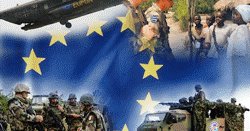The issue of defence in the EU has long been the focus of much debate. Most member states still regard defence as an area of ‘high politics’ and one of the last remaining bastions of sovereignty in a globalising world. This stance is reflected in the soporiferous nature of the Common Foreign and Security Policy (CFSP), which is undermined by a lack of funding, inter-governmental squabbling and competition from other defence-pacts such as NATO.
Nevertheless, important steps have been taken to advance a single EU military capability. 1997 saw the incorporation of the Petersberg Tasks into the European Security and Defence Policy (ESDP), which mandated the EU to undertake humanitarian, peace-making and peace-keeping missions. This was met in 1998 with the signing of the St. Malo Agreement with a view to garnering closer defence cooperation and enhanced military harmonisation [1].
Elite Protection
However, Sarkozy has recently let his feelings be known about the state of torpidity currently afflicting the EU’s defence policy, when he claimed that not enough was being done to protect Europeans [2] . This echoes a widespread feeling of animosity towards the EU’s errant failure to avert atrocities such as those witnessed in the Balkans. It is within this context that Sarkozy has revealed plans to forge an ‘elite’ defence force composed of France, Germany, Italy, Poland, Spain and the United Kingdom (UK) [3].
Pierre Lellouche, Sarkozy’s defence spokesperson, unveiled the proposals when he outlined eight specific tasks that required action if progress was to be made within the ambit of EU defence matters. The tasks include the formation of a 60,000 strong Rapid Reaction Force – initial plans for the force had never taken-off [4] – a commitment of 2% of GDP annually, a ‘Europeanisation’ of military bases and procurement and the establishment of the EU’s own military capabilities [5] .
The plan comes on the back of the November, 2007 speech Sarkozy gave to the European Parliament where he made clear that more had to be done in forming an EU defence identity [6]. Since then Sarkozy has committed numerous troops to the EU’s force in Chad and paid a recent visit to Africa to re-negotiate its defence presence there. But even with this momentum it will not be easy for Sarkozy to rectify the problems at the kernel of the CFSP and ESDP.
Feeding the Beast
Such problems are both financial and political. From a financial perspective, and to borrow one of Mark Leonard’s observations, the EU currently spends more on the cleaners for its offices in Brussels than it does on the CFSP [7] . This is coupled with the fact that the EU does not spend much on research and development nor does it have the types of military ‘economies of scale’ needed to cut overall defence costs. None of these Brobdingnagian tasks can be completed with just six member states.
From a political perspective, Sarkozy should not take the military support he craves for granted. At a recent lecture to the College of Europe in Bruges David Miliband - Britain’s Foreign Secretary - stated that while it was ‘embarrassing’ [8] that the EU could not get its defence policy in order the UK had certain foreign policy differences to France – chiefly Turkey’s EU accession - and would rather continue through existent EU structures and NATO [9] .
Furthermore, while Sarkozy should be commended in wanting a strong EU military presence in the world, it will not be prudent to achieve this by undermining overall solidarity. Should six states ever undertake military action on behalf of twenty-seven? Should they ever do it under an EU-banner? Surely it is prudent to construct an environment whereby the CFSP and ESDP are directed by consensus through the Council rather than by the whims of individuals.
Six Months Later…
Expect then a frantic six-month period while France holds the EU Council Presidency, but also expect Sarkozy’s ambitious plans to fail. Sarkozy will have too much of a full-plate to undertake the cyclopean task of reorganising the CFSP or ESDP within six-months – it has taken nearly sixteen years to arrive at the CFSP’s present state. Nevertheless, if his tenure manages to highlight the importance of defence funding and research and development it might prove to be the impetus the EU needs.
EU member states should take Sarkozy’s proposals seriously especially if the EU wants to be a stronger political and military force for good in the world. In this sense one shares Sarkozy’s frustrations, but whether a genuine answer to such dissatisfactions lay in the formation of any elite military group remains to be seen.


Follow the comments: |
|
